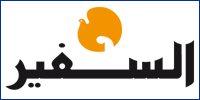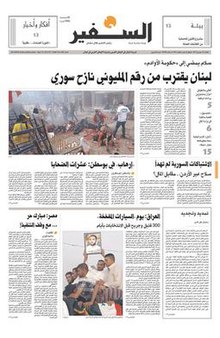Assafir
 |
|

As-Safir front page, 16 April 2013
|
|
| Type | Daily newspaper |
|---|---|
| Format | Broadsheet |
| Publisher | Dar Al Safir |
| Editor | Talal Salman |
| Founded | 26 March 1974 |
| Political alignment | Pan-Arab |
| Language | Arabic |
| Headquarters | Beirut, Lebanon |
| Circulation | 50,000 (2012) |
| Website | Official website |
As-Safir (Arabic: السفير), meaning The Ambassador, is a leading Arabic-language daily newspaper in Lebanon. The headquarters of the daily is in Beirut. It has been in circulation from March 1974 until December 2016. The last issue of the paper was published on 31 December 2016.
As-Safir was first published by Talal Salman on 26 March 1974 as an Arabic political daily. Talal Salman also served as chief editor of the paper. In 2005, the daily's chief editor was late Joseph Samaha. The publisher of the daily is Dar Al Safir. It is published in broadsheet format.
On 18 July 2011, the paper, together with Al Akhbar, another daily published in Lebanon, was banned in Syria.
As-Safir had a weekly page on the environmental issues.
As-Safir stated its mission as to be "the newspaper of Lebanon in the Arab world and the newspaper of the Arab world in Lebanon." (in Arabic جريدة لبنان في الوطن العربي وجريدة الوطن العربي في لبنان) This remained the slogan printed on the paper's masthead. It also adopted the slogan "The voice of voiceless" (in Arabic صوت اللذين لا صوت لهم) The paper provided an independent voice for the left-wing, Pan-Arab tendency which was increasingly active in Lebanese intellectual and political life in the years after the Arab defeat in the Six-Day War. It also focused on issues pertaining to the Muslim world, advocated Arab nationalism, was close to Hezbollah and had a pro-Syrian stance.
Another Lebanese daily, An-Nahar, was cited as the biggest rival of As-Safir. In the mid-1990s, the paper was described as a left-of-center paper, whereas An-Nahar as a right-of-center paper. During the same period, As-Safir was also described by Robert Fisk as a Syrian-backed newspaper. In the 2000s these papers were again supporters of two opposite poles in Lebanon, in that An-Nahar is a supporter of March 14 alliance, whereas As-Safir supported March 8 alliance.
...
Wikipedia
